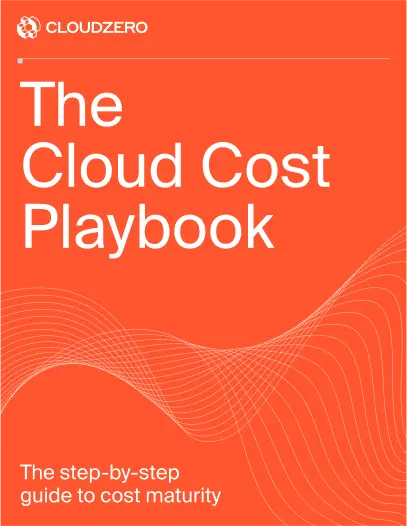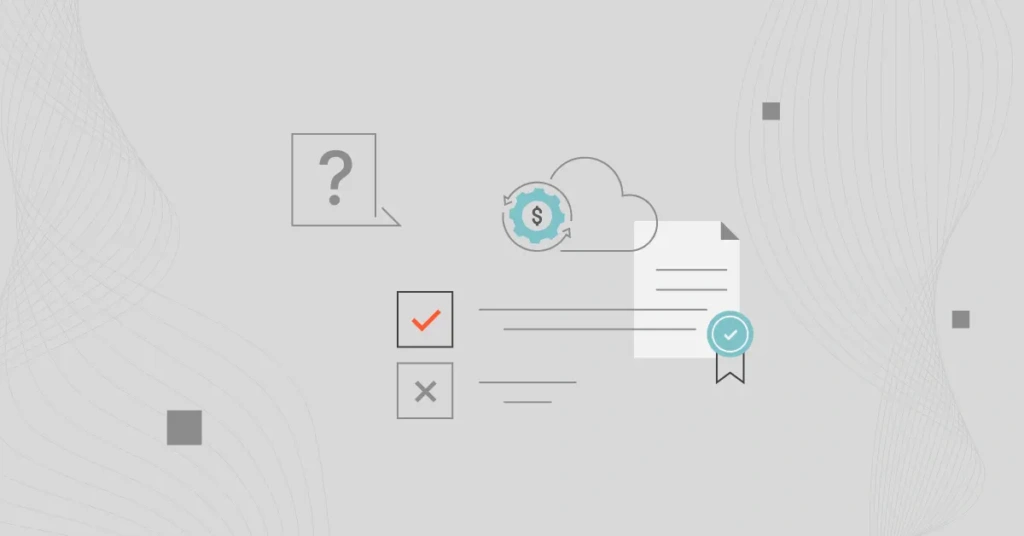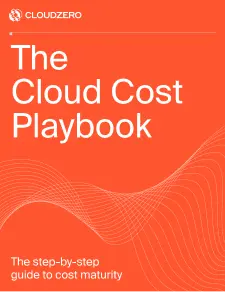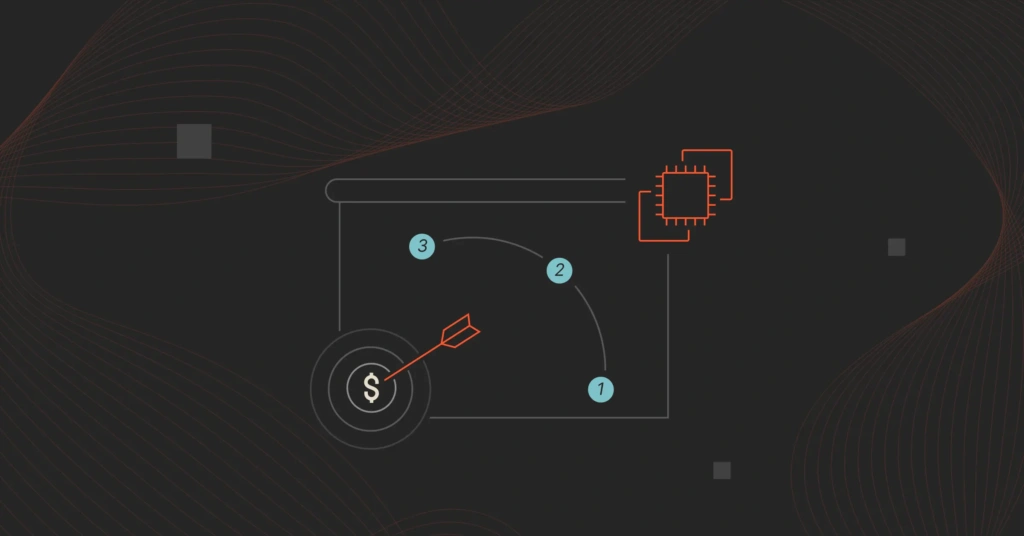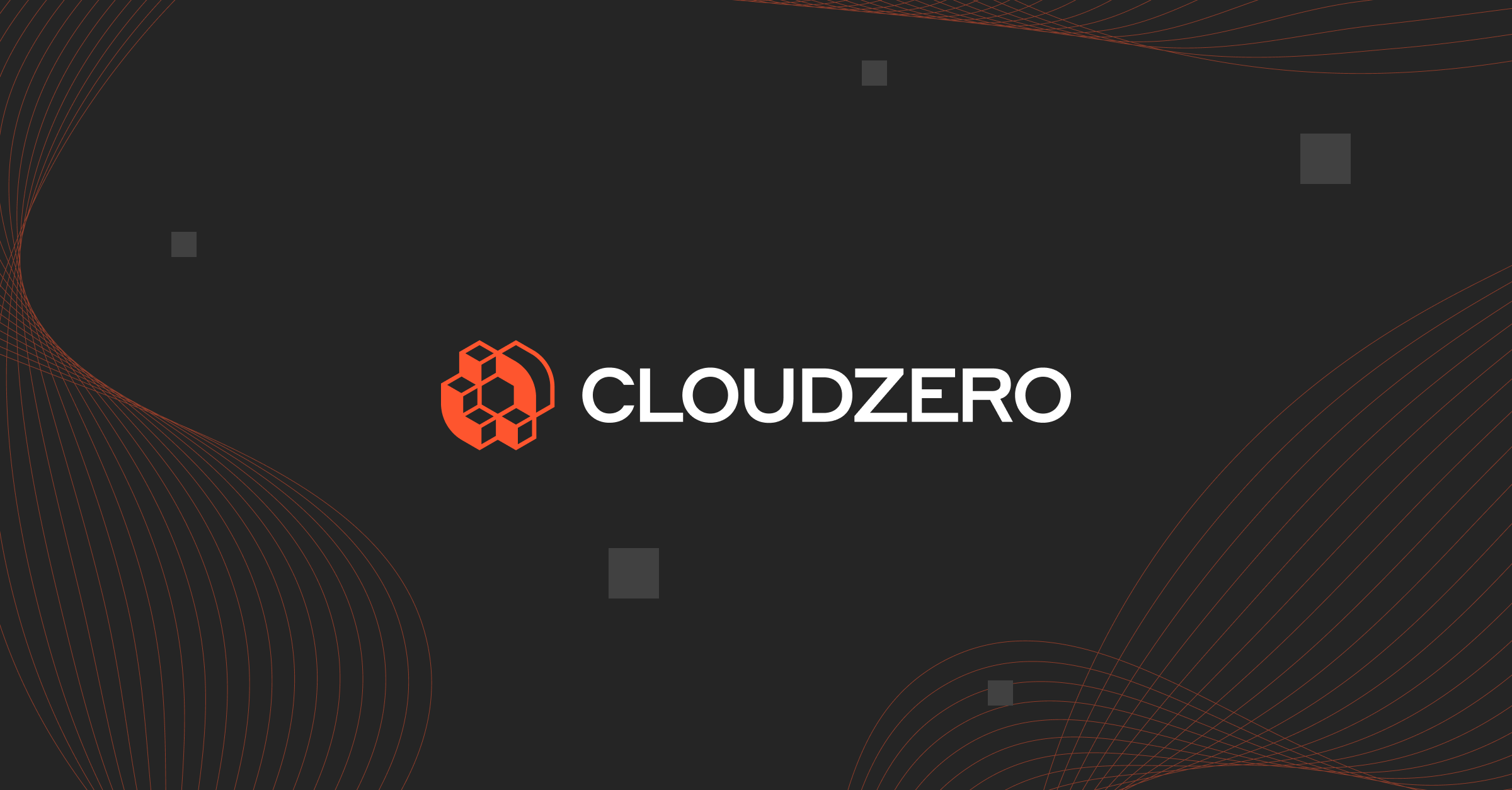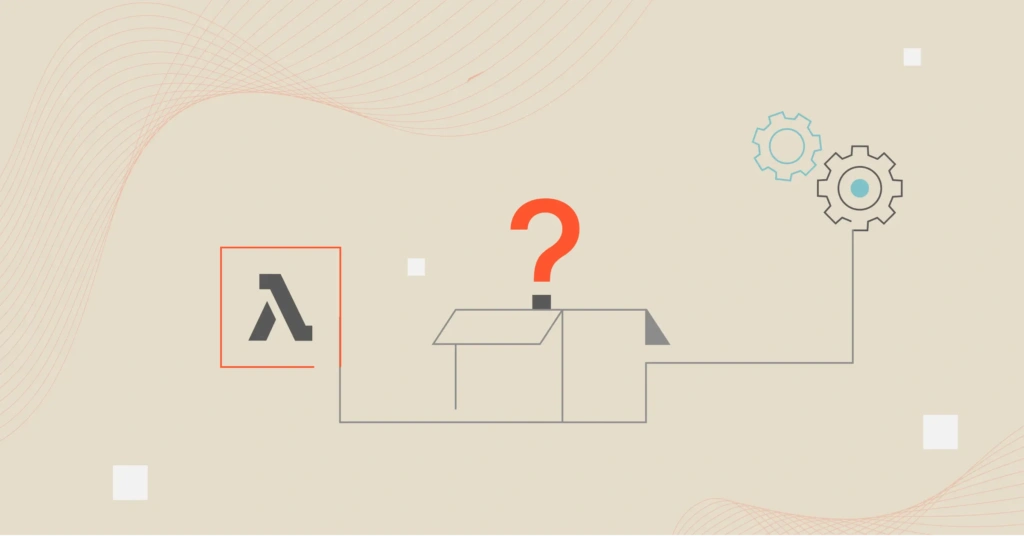At its core, FinOps is a cultural practice that brings together finance, technology, and business teams to manage and optimize cloud spending. For SaaS companies, where cloud infrastructure is integral to operations, FinOps practices directly impact the bottom line.
But as with any emerging discipline, the big question is: Is a FinOps certification truly worth the time and financial investment?
In the next few minutes, we’ll break this down, specifically for those in the SaaS industry, so you can make an informed decision.
What Is A FinOps Certification?
A FinOps certification is a professional credential that validates expertise in Financial Operations (FinOps).
At CloudZero, we see FinOps as more than just minimizing cloud waste. It’s also about driving operational efficiency while maintaining engineering velocity, delivering optimal user experiences, and fostering innovation.
As Phil Pergola, CEO of CloudZero, emphasizes, achieving this requires a deep understanding of unit economics, engineering accountability, and cost visibility — all essential for driving better business outcomes.
As such, FinOps certification programs are designed for professionals involved in cloud financial management.
Here’s what that looks like:
- Financial analysts: These professionals manage cloud budgets and forecasts, often focusing on justifying cloud investments by analyzing potential returns on investment (ROI).
- Cloud engineers/architects: Here, the professionals design and maintain cloud infrastructure. As a FinOps expert in this role, you’d help your team build a cloud environment that prioritizes operational efficiency and cost-effective solutions at the code level, ensuring built-in, long-term savings.
Curious how this works in practice? Check out how the Engineering-Led Optimization (ELO) Approach works.
- IT professionals: These engineers integrate cost-efficiency into everyday technical operations, applying FinOps principles whenever possible.
A skilled FinOps specialist here can help the team pinpoint cost-saving opportunities without compromising innovation, user experience, or flaring relations between finance and engineering.
- Business leaders: These decision-makers oversee cloud investments and financial strategies. A FinOps specialist in this role goes beyond simple cost-cutting. They also identify strategic investment opportunities to maximize market share, profitability, and competitive advantage.
For example, you might analyze FinOps metrics like Cost per Customer. With this intel, you can determine which segments are the most profitable and redirect marketing efforts to target high-return customers.
You’ll also want to read:
3 Real-Life Examples Of Companies Measuring Cloud Cost Per Customer
What To Do When A Customer (Or Segment) Is Costing Your SaaS Business Too Much
Why Consider A FinOps Certification?
Earning a FinOps certification is more than adding a credential to your resume. It’s about equipping yourself, your team, and your organization with the skills to turn cloud investments into measurable ROI.
Consider this:
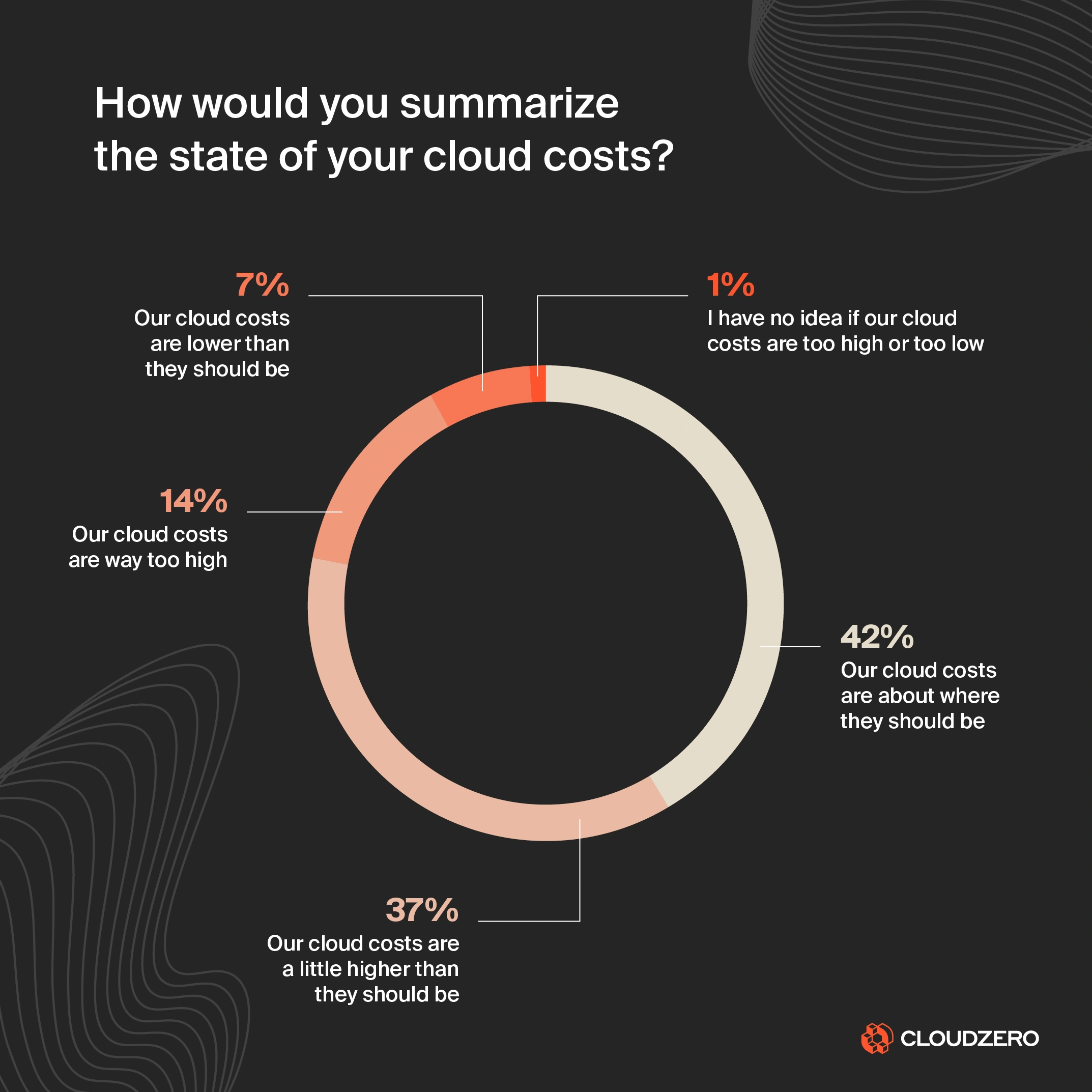
Image: CloudZero State of Cloud Cost Report
What you are seeing there is a staggering 58% of respondents who told us their cloud costs were too high.
Here’s the kicker.
- For engineers, 66% said a lack of visibility into cloud costs disrupted their work. Even more concerning, 22% said it caused high levels of disruption (an equivalent to losing an entire sprint).
- For finance professionals, 23% also reported high levels of disruption. So, cloud cost visibility is as much a challenge for finance teams as it is for engineers.
Additionally, companies waste an average of 33% of their cloud budgets due to overprovisioning, idle resources, and the rising costs of Generative AI in the cloud.
For example, Datadog reports that idle resources account for about 80% of container spend.
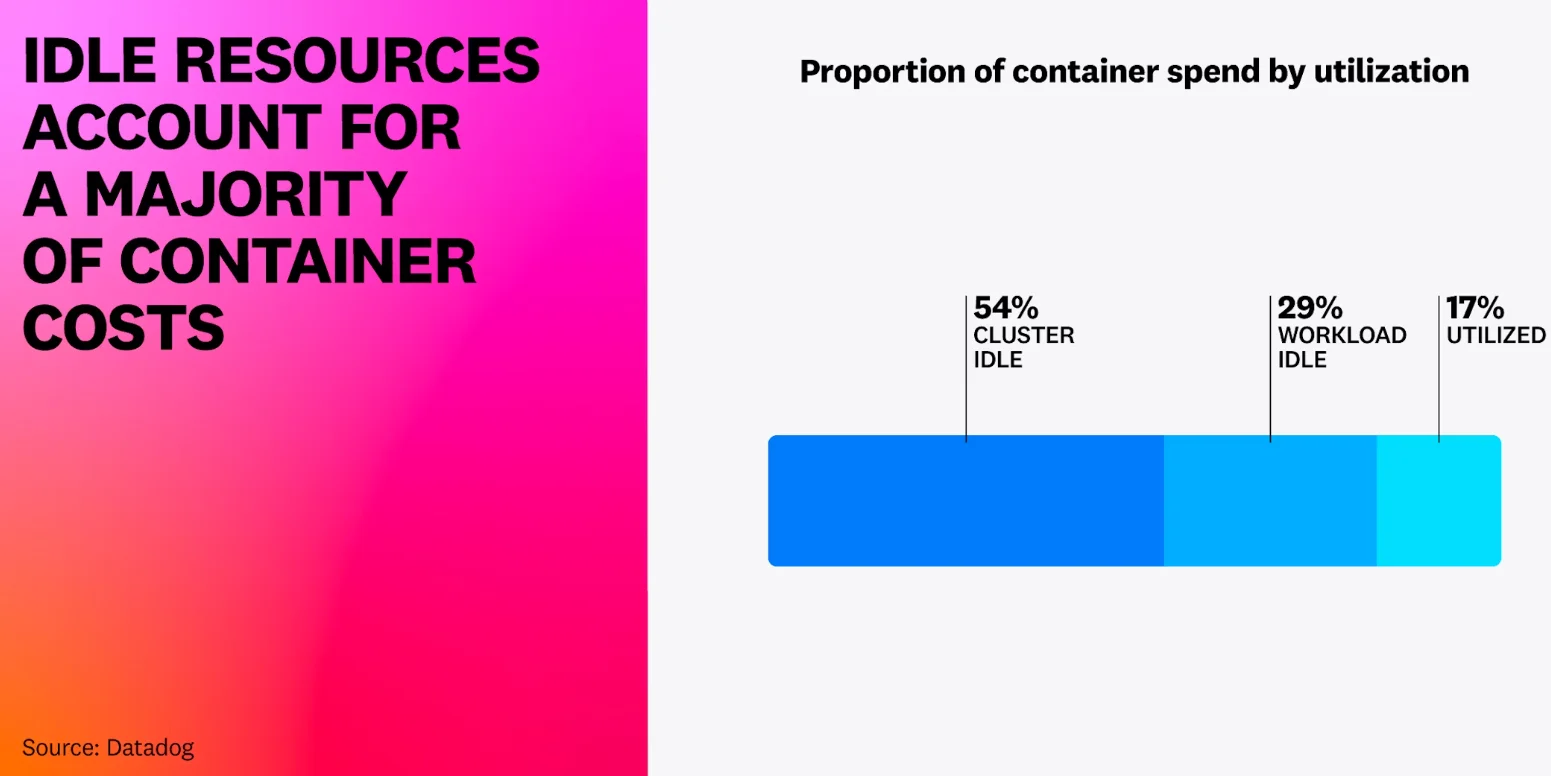
Image: Datadog State of Cloud
The report also shows that most organizations do not purchase enough commitment-based discounts, such as Reserved Instances and Savings Plans, to cover even half of their eligible cloud spend.
They are not sure where to start and are leaving a lot of money on the table.
Ultimately, a recent Rackspace report found that 40% of respondents cited talent shortages as the biggest roadblock to effective cloud management.
If you can help your organization minimize cloud waste and maximize cloud ROI, you’ll certainly warrant a seat at the table.
Enough about tables. Let’s focus on action. Here’s how to ramp up your skills and apply FinOps best practices.
Top FinOps Certifications To Help You Sharpen Your Expertise (And How Much A FinOps Certification Costs)
There are several certification options. Also, FinOps certification costs vary based on the certifying body and the level of certification you choose.
Here’s a breakdown of the costs you can expect with different FinOps certifications:
1. CloudZero Practitioner Certification
The CloudZero Practitioner Certificate is a valuable credential for cloud operations, finance, and engineering professionals. In this training, you’ll gain hands-on experience with CloudZero’s unique approach to cloud cost optimization: Cloud Cost Intelligence.
Unlike most cost tools that provide averages, CloudZero delivers precise, actionable cloud cost insights.
This approach helps you bridge the gap between technical cloud usage, financial accountability, and business strategy.
CloudZero was also the first to help organizations take control of unit costs — and you’ll learn from a proven framework. Our own team used the same strategies taught in this certification to uncover over $1.7 million in annualized savings within our infrastructure.
You’ll also learn to:
- Accurately calculate unit costs, including Cost per Customer, Cost per Feature, and Cost per Deployment. Learn how to automate FinOps by allocating costs across more than a dozen FinOps metrics — customized to reflect how your business operates, rather than relying on generic metrics that often create more confusion than clarity.
- Pinpoint the teams, products, and processes driving cloud spending. This way, you’ll know exactly where your money is going and where to optimize usage to cut costs.
- Optimize costs without sacrificing performance or innovation. Learn how to smartly manage cloud costs without sacrificing growth. Instead of cutting costs at all costs, you’ll also discover how to maximize cloud ROI — including identifying new revenue opportunities, profitable segments, and strategic investment areas.
This certification is especially valuable post-CloudZero onboarding and is ideal for companies in the FinOps Crawl phase.
Brands like Wise, Coinbase, and MalwareBytes already use CloudZero’s cost intelligence approach to transform their cloud financial management — and now, you can, too. See this CloudZero Practitioner Certification guide for more details.
2. FinOps Foundation certifications
The FinOps Foundation provides a framework and community where professionals can share best practices and industry standards.
The program includes FinOps certifications for individuals, service providers, and organizations.
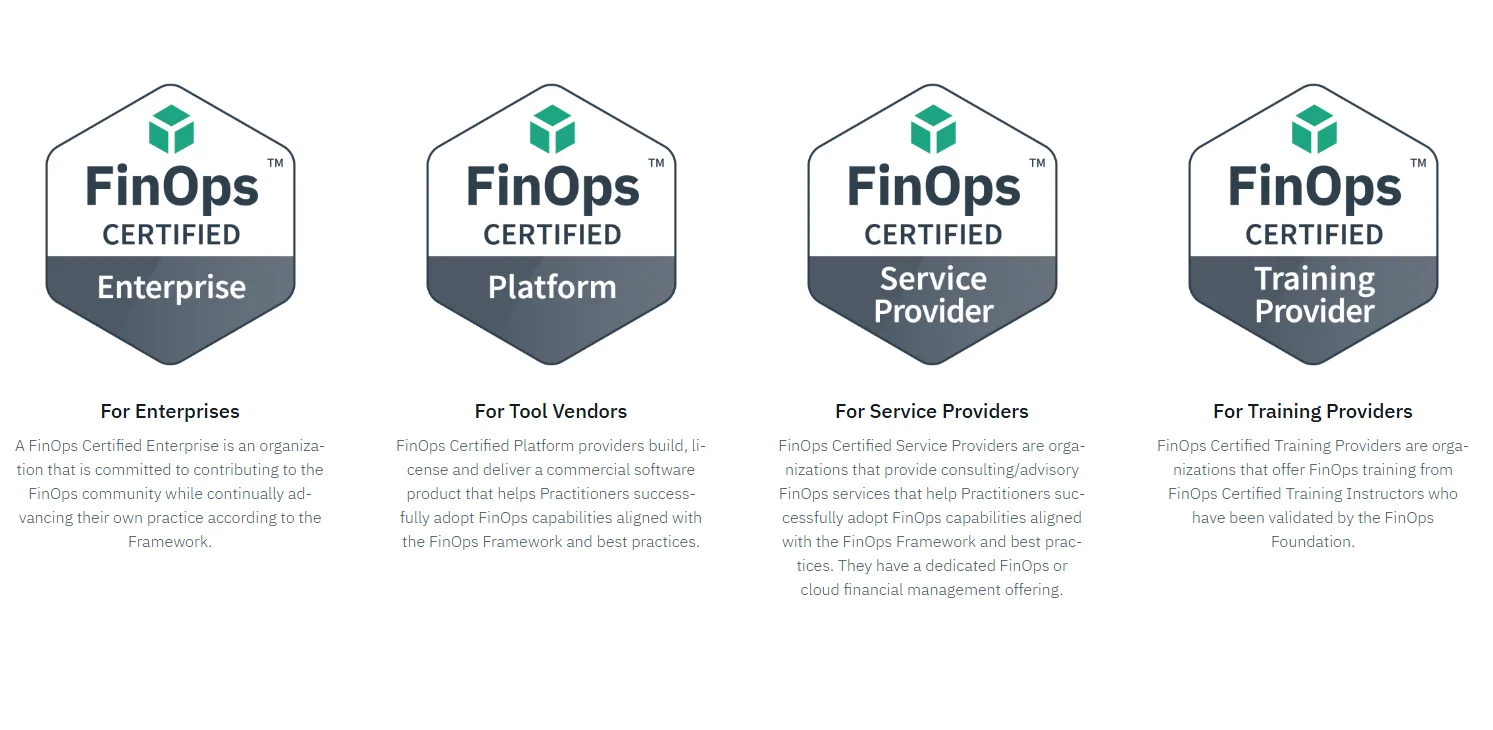
Image: FinOps Foundation certification categories
Also, the FinOps Foundation offers several certifications tailored to different roles and levels of expertise in cloud financial management.
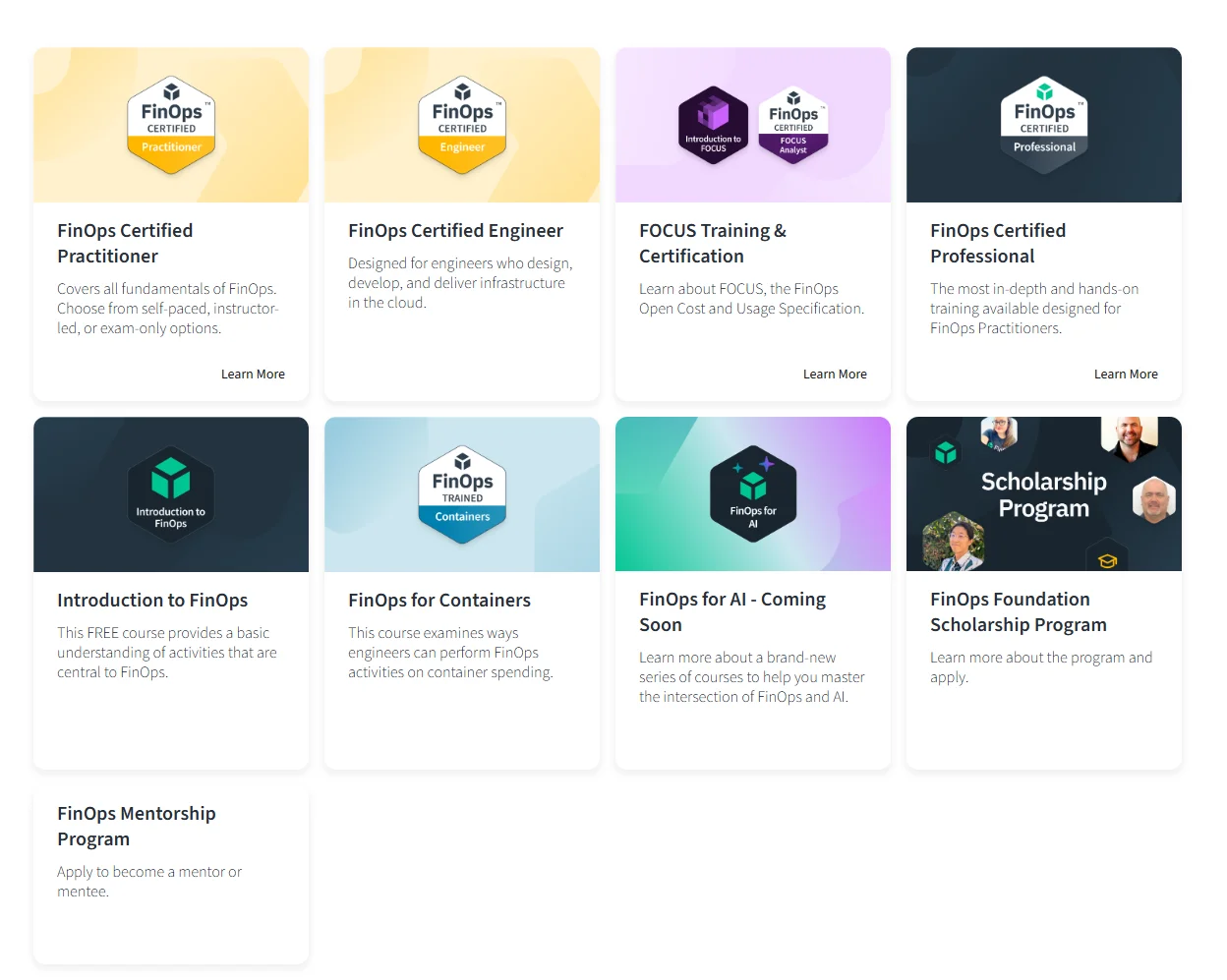
Image: Types of FinOps Foundation certifications
Here are more details about the main types of FinOps certifications available today:
FinOps Certified Practitioner (FOCP)
This is an entry-level certification that covers the basics of FinOps. This includes cloud economics, cost optimization, and financial management. It is designed for professionals involved in cloud cost management, such as financial analysts, cloud architects, engineers, and business leaders.
Curriculum: The course includes modules on cloud cost management, financial operations, and governance. It provides a comprehensive overview of FinOps principles and practices.
Cost: The six-hour self-paced online program costs $599, and the instructor-led online one (10 hours) costs $1,500, while the exam alone is $325. Training modules only cost $250. The certification is valid for 12 months.
Who it’s for: Ideal for those new to FinOps or looking to boost their foundational knowledge.
FinOps Certified Engineer (FCE)
This certification focuses on the technical aspects of FinOps, targeting engineers responsible for designing and managing cloud infrastructure. It equips them with hands-on knowledge to integrate cost optimization into technical setups.
Curriculum: Covers cloud cost management, automation, and governance with hands-on exercises and real-world examples.
Cost: The self-paced course costs $500 and includes access to video lectures and course materials for a year. Its exam only costs $325, while the training modules only cost $250.
Who it’s for: Technical professionals seeking to optimize cloud resources.
FinOps Certified Professional (FCP)
This option provides in-depth knowledge for strategic financial decision-making and leading cost-optimization initiatives.
Curriculum: Includes interactive modules, live sessions, and access to a private Slack channel. Its 50-hour length covers advanced FinOps practices and real-world case studies.
Cost: The course costs $1,999, and the exam fee is $1,500. The certification requires an active FOCP certification and six months of FinOps experience. You’ll also need an active FinOps Certified FOCUS Analyst before taking the exam.
Who it’s for: Suitable for experienced professionals looking to advance their careers in FinOps leadership.
FinOps Certified FOCUS Analyst
The FOCUS specialized certification covers the FinOps Open Cost & Usage Specification (FOCUS). It teaches you about managing and analyzing cloud billing data across different providers.
Curriculum: Covers creating, understanding, and acting on cost data for informed decisions.
Cost: $600.
Who it’s for: This is for you if you work with cloud billing data or want to improve your analytical skills.
FinOps for Containers (FFC)
Pick this option to learn how to optimize costs in containerized environments and microservices.
Curriculum: Provides in-depth insights into optimizing container costs.
Cost: $250 with online access for 12 months.
Who it’s for: Cloud engineers and DevOps practitioners working extensively with containerized applications.
There are also additional certifications. For instance, CloudZero successfully completed the FinOps Foundation Platform Certification and provides FinOps-as-a-Service offerings to help organizations optimize cloud costs effectively.
3. The GSDC FinOps Certified Practitioner (FCP)
GSDC’s FCP certification validates expertise in cloud financial operations, focusing on cost optimization, budgeting, and financial governance. Check it out if you are in finance or are an IT professional managing cloud costs.
You’ll invest $400 for lifetime validity. It requires passing a 90-minute exam with 40 multiple-choice questions.
4. Other Options
Cloud providers like AWS and Azure do not currently offer dedicated FinOps certifications. However, they provide courses and training programs that cover cloud financial management principles, helping you build a strong FinOps foundation (ahem!).
Take the AWS Cloud for Finance Professionals Course, for example.
The course does not lead to a FinOps certification. However, it can equip your finance professionals with the knowledge and tools needed to optimize costs within the AWS ecosystem.
Supercharge Your FinOps Maturity With Cloud Cost Intelligence
By now, you’ll agree that having the right knowledge and tools to understand, control, and optimize cloud spend can significantly impact your bottom line.
As you progress through your FinOps maturity journey, you’ll also need a FinOps platform that aligns with your goals and supports you at every stage.
That’s where CloudZero comes in:
- CloudZero has successfully completed the FinOps Foundation Platform Certification. Expect to get real-time cost visibility insights that actually help you drive efficiency and maximize cloud ROI.
- Our Account Managers are all FinOps-certified practitioners. This hands-on expertise has helped many of our customers recoup their entire annual subscription in just three months and, even better, achieve an average of 22% annual savings without compromising performance or engineering innovation.
- CloudZero’s Engineering-Led Optimization (ELO) empowers engineers to speak the same language as finance. This ensures your “Fin” and “Ops” align to build and run cost-efficient solutions. No more last-minute emergency meetings about overspending.
Ambitious teams at Rapid7, Drift, and Skyscanner trust CloudZero to accelerate their FinOps maturity — and we just helped Upstart save $20 million. Here’s your turn. Risk-free.  to see how CloudZero can supercharge your FinOps implementation today.
to see how CloudZero can supercharge your FinOps implementation today.
